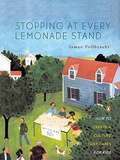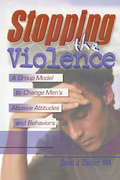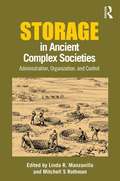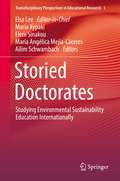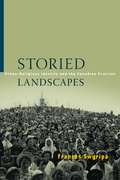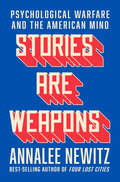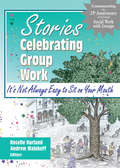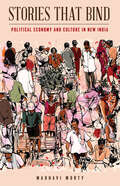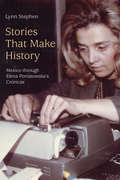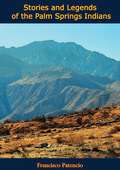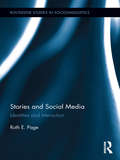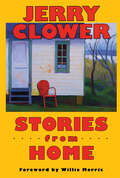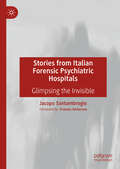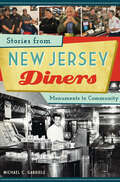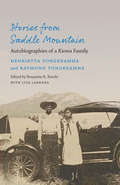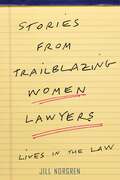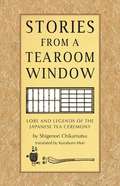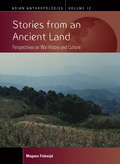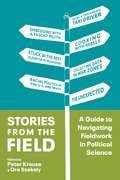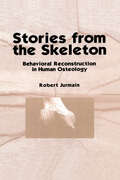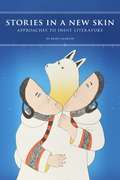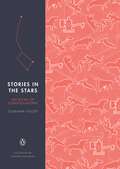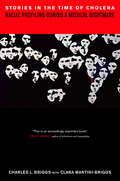- Table View
- List View
Stopping at Every Lemonade Stand
by James VollbrachtChildren's lives today are complex, stressful, and dangerous. Kids are overscheduled, come home to empty houses and neighborhoods where they don't know a soul, and in school, face violence-all too often from their peers. In Stopping at Every Lemonade Stand, James Vollbracht provides a blueprint for transforming our unstable and disconnected culture into a healthier, supportive one. Vollbracht bases his approach on six overlapping circles of community-our personal circle, families, neighborhoods, larger communities, business worlds, and elders-and outlines simple actions within each circle that will help rescue our kids. Through a rich blend of heartwarming anecdotes and creative, practical strategies, Stopping at Every Lemonade Stand affirms the age-old wisdom that the power and responsibility to heal our communities rest in our own hands.
Stopping the Violence: A Group Model to Change Men's Abusive Attitudes and Behaviors
by David J DeckerHelp men learn to change abusive behavior! Stopping the Violence: A Group Model to Change Men&’s Abusive Attitudes and Behaviors helps practitioners reduce the negative atmosphere in a batterers&’ group for men while adapting to clients&’ individual needs, abilities, and levels of motivation. Useful in any type of patient setting, this comprehensive, hands-on guide provides a complete, step-by-step model for a batterer program that includes all of the forms, handouts, tools, and assignments necessary for the treatment process. Pro-feminist, cognitive, and behavioral in its orientation, this program works to eliminate the mindset that dominates, controls, and leads to the battering of women. The focus throughout the treatment process described in Stopping the Violence is not only on ending physical violence, but addressing what causes it. The exercises and suggestions in this program will teach your clients how emotional abuse, verbal abuse, substance abuse problems, mental health issues, and entitled and controlling attitudes contribute to and lead to battering. You will also find methods to help clients learn to take responsibility for their actions and discover if their childhoods have had an impact on their assumption of patriarchal and controlling attitudes. In addition, Stopping the Violence offers exercises on building self-confidence, self-esteem, self-control, and emotional support for your clients. This guide offers other valuable suggestions and exercises, such as: an explanation of 12 educational units to be presented by the therapist, including such topics as abuse and its effects, anger regulation, stress management, shame and empowerment, assertiveness, communication, and conflict resolution showing the client how to and why he should develop an increased realization of the impact of his abuse assisting the client in learning to monitor his internal and external escalation-to-violence cues creating a supportive group atmosphere that will decrease men&’s shame and isolation and increase their ability to feel empathy for themselves and others providing a reading list with additional resources that clients can use to enhance their treatment Vital to any batterers&’ treatment that is starting or already exists, Stopping the Violence will help you teach your clients how they can find pride as nonabusive men in a society full of patriarchal values, as well as teach them to be in control of themselves-not their partners or their children. This guide will help you identify and change your clients&’ abusive behaviors and successfully show them how abusive behavior is hurtful and destructive for everyone involved.
Storage in Ancient Complex Societies: Administration, Organization, and Control
by Linda R. Manzanilla Mitchell RothmanThe ability to accumulate and store large amounts of goods is a key feature of complex societies in ancient times. Storage strategies reflect the broader economic and political organization of a society and changes in the development of control mechanisms in both administrative and non-administrative—often kinship based—sectors. This is the first volume to examine storage practices in ancient complex societies from a comparative perspective. This volume includes 14 original papers by leading archaeologists from four continents which compare storage systems in three key regions with lengthy traditions of complexity: the ancient Near East, Mesoamerica, and Andes. Storage in Ancient Complex Societies demonstrates the importance of understanding storage for the study of cultural evolution.
Stored in the Bones: Safeguarding Indigenous Living Heritages
by Agnieszka Pawłowska-MainvilleA new tool for preserving Indigenous cultural heritages Intangible cultural heritage (ICH) refers to community-based practices, knowledges, and customs that are inherited and passed down through generations. While ICH has always existed, a legal framework for its protection only emerged in 2003 with the UNESCO Convention for the Safeguarding of Intangible Cultural Heritage. In Stored in the Bones, Agnieszka Pawłowska-Mainville details her work with Anishinaabeg and Inninuwag harvesters, showcasing their cultural heritage and providing a new discourse for the promotion and transmission of Indigenous knowledge. The book focuses on lived experiences of the akiwenziyag and kitayatisuk, “men of the land” in Anishinaabemowin/Ojibwe and Inninumowin/Cree, respectively. These men shared their dibaajimowinan and achimowinak (life stories)—from putting down tobacco to tending traplines—with Pawłowska-Mainville during her fifteen years of research in Manitoba and northwestern Ontario. By performing their living heritage, the akiwenziyag and kitayatisuk are, in the words of Richard Morrison, doing what they need to do to “energize and strengthen their bones as they walk this Earth." Illustrating the importance of ICH recognition, Pawłowska- Mainville also explores her experiences with the Manitoba Clean Environment Commission regarding the impacts of hydro development and the Pimachiowin Aki UNESCO World Heritage Site nomination. Stored in the Bones enriches discussions of treaty rights, land claims, and environmental and cultural policy. Presenting practical ways to safeguard ICH and an international framework meant to advance community interests in dealings with provincial or federal governments, the study offers a pathway for Indigenous peoples to document knowledge that is “stored in the bones.”
Storied Doctorates: Studying Environmental Sustainability Education Internationally (Transdisciplinary Perspectives in Educational Research #1)
by Elsa LeeThis book brings together the diverse narratives of researchers’ personalized stories about the process of doing doctoral research (PhD) in the field of Environmental and Sustainability Education (ESE) and about the life after the completion of such life-forming experience. The narratives go beyond the academic to discuss the different ways in which doctoral study in the field of environmental and sustainability education is experienced at the personal and professional level. Contributors are located in different countries in Europe, Australasia and Latin America. The different countries that the authors write from matters because it contextualizes both the process of studying environmental and sustainability education and the way in which this is experienced at a time when the world has become increasingly conscientized towards environmental challenges. As such the book is appreciated by established and emerging scholars in this field and in related fields around the world. Readers are presented with a comprehensive volume ideal for aspiring ESE researchers, supervisors, policy-makers and practitioners.
Storied Landscapes: Ethno-Religious Identity and the Canadian Prairies (Studies in Immigration and Culture #5)
by Frances SwyripaStoried Landscapes is a beautifully written, sweeping examination of the evolving identity of major ethno-religious immigrant groups in the Canadian West. Viewed through the lens of attachment to the soil and specific place, and through the eyes of both the immigrant generation and its descendants, the book compares the settlement experiences of Ukrainians, Mennonites, Icelanders, Doukhobors, Germans, Poles, Romanians, Jews, Finns, Swedes, Norwegians, and Danes. It reveals how each group’s sense of identity was shaped by a complex interplay of physical and emotional ties to land and place, and how that sense of belonging influenced, and was influenced by, relationships not only within the prairies and the Canadian nation state but also with the homeland and its extended diaspora. Through a close study of myths, symbols, commemorative traditions, and landmarks, Storied Landscapes boldly asserts the inseparability of ethnicity and religion both to defining the prairie region and to understanding the Canadian nation-building project.
Stories Are Weapons: Psychological Warfare and the American Mind
by Annalee NewitzOne of Publishers Weekly's Top 10 Politics/Current Events books of Spring 2024 A sharp and timely exploration of the dark art of manipulation through weaponized storytelling, from the best-selling author of Four Lost Cities. In Stories Are Weapons, best-selling author Annalee Newitz traces the way disinformation, propaganda, and violent threats—the essential tool kit for psychological warfare—have evolved from military weapons deployed against foreign adversaries into tools in domestic culture wars. Newitz delves into America’s deep-rooted history with psychological operations, beginning with Benjamin Franklin’s Revolutionary War–era fake newspaper and nineteenth-century wars on Indigenous nations, and reaching its apotheosis with the Cold War and twenty-first-century influence campaigns online. America’s secret weapon has long been coercive storytelling. And there’s a reason for that: operatives who shaped modern psychological warfare drew on their experiences as science fiction writers and in the advertising industry. Now, through a weapons-transfer program long unacknowledged, psyops have found their way into the hands of culture warriors, transforming democratic debates into toxic wars over American identity. Newitz zeroes in on conflicts over race and intelligence, school board fights over LGBT students, and campaigns against feminist viewpoints, revealing how, in each case, specific groups of Americans are singled out and treated as enemies of the state. Crucially, Newitz delivers a powerful counternarrative, speaking with the researchers and activists who are outlining a pathway to achieving psychological disarmament and cultural peace. Incisive and essential, Stories are Weapons reveals how our minds have been turned into blood-soaked battlegrounds—and how we can put down our weapons to build something better.
Stories Celebrating Group Work: It's Not Always Easy to Sit on Your Mouth
by Andrew Malekoff Roselle KurlandStories Celebrating Group Work: It&’s Not Always Easy to Sit on Your Mouth celebrates the 25th anniversary of the esteemed journal Social Work with Groups with a collection of 21 narratives from group work practitioners and educators. These highly personal stories from a range of social workers-young and old, "famous" and not so famous-reflect each author's development and experience, serving as both instruction and inspiration for practitioners and educators. This unique collection-by turns humorous, moving, profound, and down-to-earth-gets to the heart of what it means to be a member of the social work community. Each chapter of Stories Celebrating Group Work draws on its contributor&’s area of expertise and interest in a specific topic, chronicling the development of the author's understanding, appreciation, and skill. Authors address the everyday concerns of social work professionals, such as maximizing mutual aid, promoting positive norms, maintaining authority in group work, managing conflict, dealing with taboo subjects, building a group work culture in a human services organization, working with a co-leader, tapping the strengths of group members, and addressing social change. The individual stories of working with men, women, and children suffering through abuse, homelessness, addiction, and teenage pregnancy, in places as diverse as East Harlem, Maine, Canada, Nebraska, Long Island, Haiti, Uruguay, help form a collegial spirit as group workers gain insight from the theory and practice of those who went before. The personal stories you&’ll find in Stories Celebrating Group Work include: "How I Became a Social Worker" "The Power of Group Work with Kids" "How the Relational Model of Group Work Developed" "My Love Affair with Stages of Group Development" "But I Want to Do a Real Group" "Racial Difference and Human Commonality: The Worker-Client Relationship" and many more! Stories Celebrating Group Work: It&’s Not Always Easy to Sit on Your Mouth is a one-of-a-kind collection of stories, at once entertaining and educational. It's an essential read for beginning and seasoned human services practitioners, and educators involved with, or interested in, working with groups.
Stories That Bind: Political Economy and Culture in New India
by Madhavi MurtyStories that Bind: Political Economy and Culture in New India examines the assertion of authoritarian nationalism and neoliberalism; both backed by the authority of the state and argues that contemporary India should be understood as the intersection of the two. More importantly, the book reveals, through its focus on India and its complex media landscape that this intersection has a narrative form, which author, Madhavi Murty labels spectacular realism. The book shows that the intersection of neoliberalism with authoritarian nationalism is strengthened by the circulation of stories about “emergence,” “renewal,” “development,” and “mobility” of the nation and its people. It studies stories told through film, journalism, and popular non-fiction along with the stories narrated by political and corporate leaders to argue that Hindu nationalism and neoliberalism are conjoined in popular culture and that consent for this political economic project is crucially won in the domain of popular culture. Moving between mediascapes to create an archive of popular culture, Murty advances our understanding of political economy through material that is often seen as inconsequential, namely the popular cultural story. These stories stoke our desires (e.g. for wealth), scaffold our instincts (e.g. for a strong leadership) and shape our values.
Stories That Make History: Mexico through Elena Poniatowska’s Crónicas
by Lynn StephenFrom covering the massacre of students at Tlatelolco in 1968 and the 1985 earthquake to the Zapatista rebellion in 1994 and the disappearance of forty-three students in 2014, Elena Poniatowska has been one of the most important chroniclers of Mexican social, cultural, and political life. In Stories That Make History, Lynn Stephen examines Poniatowska's writing, activism, and political participation, using them as a lens through which to understand critical moments in contemporary Mexican history. In her crónicas—narrative journalism written in a literary style featuring firsthand testimonies—Poniatowska told the stories of Mexico's most marginalized people. Throughout, Stephen shows how Poniatowska helped shape Mexican politics and forge a multigenerational political community committed to social justice. In so doing, she presents a biographical and intellectual history of one of Mexico's most cherished writers and a unique history of modern Mexico.
Stories and Legends of the Palm Springs Indians
by Francisco Patencio Margaret BoyntonChief Francisco Patencio recounts the stories and legends of his people in this slim, but, invaluable record of the Palm Springs Native Americans. Originally published in 1943 by the Palm Springs Desert Museum, the tales and traditions of the Cahuilla are kept alive in the new edition.
Stories and Social Media: Identities and Interaction (Routledge Studies in Sociolinguistics)
by Ruth E. PageThis book examines everyday stories of personal experience that are published online in contemporary forms of social media. Taking examples from discussion boards, blogs, social network sites, microblogging sites, wikis, collaborative and participatory storytelling projects, Ruth Page explores how new and existing narrative genres are being (re)shaped in different online contexts. The book shows how the characteristics of social media, which emphasize recency, interpersonal connection and mobile distribution, amplify or reverse different aspects of canonical storytelling. The new storytelling patterns which emerge provide a fresh perspective on some of the key concepts in narrative research: structure, evaluation and the location of speaker and audience in time and space. The online stories are profoundly social in nature, and perform important identity work for their tellers as they interact with their audiences - identities which range from celebrities in Twitter, cancer survivors in the blogosphere to creative writers convening storytelling projects or local histories. Stories and Social Media brings together the stories told in well-known sites like Facebook and lesser-known community archives, providing a landmark survey and critique of personal storytelling as it is being reworked online at the start of the 21st century.
Stories from Home
by Jerry ClowerBrimming with his rich humor, Jerry Clower's book manifests the unsurpassed southern art of yarn spinning. It also shows the nature of the man for whom good storytelling is more than just show business. Nashville's funniest man had a serious side. Deep in the merry heart of this comic entertainer were the codes and values that made him an esteemed humanitarian. He was named America's best country comic for nine years in a row and was called “the funniest American storyteller since Will Rogers” and “the Mouth of the Mighty Mississippi.” This boisterous, downhome man's loving, extroverted manner and his forthright display of positive feelings for others arose from the substance of sober, rock-solid regional values he gained from maturing in the rural South. Stories from Home embraces both sides of Jerry Clower, the funny man and the serious man, and shows his anecdotal humor in the mainstream of the South's great oral tradition of folktales and narratives. Jerry Clower’s hilarious stories about possum hunting, coon dogs, and the rambunctious Ledbetter clan were standards in his stage routines, videos, and albums. In Stories from Home many of his fans' favorite Clower tales are included. Here, too, is a long interview in which he explored his beliefs and tells how he gained firm convictions about race, religion, education, and family as well as an intolerance of negativism.
Stories from Italian Forensic Psychiatric Hospitals: Glimpsing the Invisible
by Jacopo SantambrogioThis book offers reflections on emerging issues in psychiatry today, told through the lens of interviews conducted with patients of the former Forensic Psychiatric Hospitals in Italy. Using narrativization, this book brings together clinical cases told in the first person which have allowed the author to develop insights into these issues. The author considers the patient/offender who poses a series of questions about mental illness itself, its origins, the factors related to its onset, such as substances, differential diagnosis, treatment paths (both pharmacological and rehabilitative) and the cultural factors that may influence the outcomes, providing invaluable insights for clinicians, researchers and students of Psychiatry and Psychology in international settings.
Stories from New Jersey Diners: Monuments to Community (American Palate Ser.)
by Michael C GabrieleFrom the author of The History of Diners in New Jersey comes a collection of true stories that capture the spirit of the Garden State. Diners are where communities across New Jersey go to celebrate milestones, form lifetime bonds and take comfort in food. Daily life at the counter or in the booth inspires sentimental recollections that reflect the state&’s spirit and history. In Stories from New Jersey Diners, local historian Michael C. Gabriele documents colorful stories from the Diner Capital of the World. Late-night eats fueled Wildwood&’s wild rock-and-roll days. An entrepreneur from India traveled eight thousand miles to open a diner in Shamong. From an impromptu midnight wedding in an Elizabeth lunch wagon to a Vietnam veteran sustained by a heartfelt note from a beloved Mount Holly waitress, these are true tales from the &“Diner Capital of the World.&”
Stories from Saddle Mountain: Autobiographies of a Kiowa Family (American Indian Lives)
by Henrietta Tongkeamha Raymond Tongkeamha Lisa LaBradaStories from Saddle Mountain recounts family stories that connected the Tongkeamhas, a Kiowa family, to the Saddle Mountain community for more than a century. Henrietta Apayyat (1912–93) grew up and married near Saddle Mountain, where she and her husband raised five sons and five daughters. She began penning her memoirs in 1968, including accounts about a Peyote meeting, revivals and Christmas encampments at Saddle Mountain Church, subsistence activities, and attending boarding schools and public schools. When not in school, Henrietta spent much of her childhood and adolescence close to home, working and occasionally traveling to neighboring towns with her grandparents, whereas her son Raymond Tongkeamha left frequently and wandered farther. Both experienced the transformation from having no indoor plumbing or electricity to having radios, televisions, and JCPenney. Together, their autobiographies illuminate dynamic changes and steadfast traditions in twentieth-century Kiowa life in the Saddle Mountain countryside.
Stories from Trailblazing Women Lawyers: Lives in the Law
by Jill NorgrenHistory told through the words of one hundred groundbreaking female lawyers: &“Their stories are both a window into the past and a beacon for the future.&” —Virginia G. Drachman, author of Sisters in Law In 1950, Harvard Law School began to admit women. But for those wanting to enter the profession, the terms of engagement were clear: Only a few women would be admitted each year to American law schools, and after graduation their opportunities would never equal those open to similarly qualified men. At many law schools, well into the 1970s, men told female students that they were taking a place that might be better used by a male student who would have a career, not babies. In 2005, the American Bar Association&’s Commission on Women in the Profession initiated a national oral history project named Women Trailblazers in the Law: One hundred outstanding senior women lawyers—among them such famed figures as Ruth Bader Ginsburg, Janet Reno, Norma Shapiro, and Catherine Roraback—were asked to give their personal and professional histories in interviews conducted by younger colleagues. The interviews, made available to the author, permit these women to be written into history in their words, words that evoke pain as well as celebration, humor, and somber reflection. These are women attorneys who, in courtrooms, classrooms, government agencies, and NGOs, have rattled the world with insistent and successful demands to reshape their profession and their society. They are women who brought nothing short of a revolution to the profession of law. In this book, award-winning legal historian Jill Norgren curates these compelling stories, using them to describe the profound changes that began in the late 1960s and interweaving social and legal history with the women&’s individual experiences. &“An inspirational story of individual successes and even more important, a historical analysis of the march toward improved gender equality in America.&” ―Trial Magazine
Stories from a Tearoom Window
by Kozaburo Mori Toshiko Mori Shigenori ChikamatsuIn the eighteenth century, the warrior Shigenori Chikamatsu set down scores of legends, anecdotes and bits of lore to express the essence of the tea ceremony for the edification of tea connoisseurs. His work became Stories from a Tearoom Window, translated into English for the first time in 1982 and now available again. With stories touching on lives of great tea masters and the core ideal of natural simplicity in the tea ceremony, Stories from a Tearoom Window is a charming anecdotal tour of the world of tea.
Stories from an Ancient Land: Perspectives on Wa History and Culture (Asian Anthropologies #12)
by Magnus FiskesjöThe Wa people have a rich civilization of their own, and a deep history in the mountains of Southeast Asia. Their mythology suggests their land is the first place inhabited by humans, which they care for on behalf of the world. This book introduces aspects of Wa culture, including their approach to the world’s troubles and the lessons others might learn from it. It also presents a new interpretation of Wa headhunting, questioning explanations that see it as a primitive custom, and instead placing it within the fraught history of the last few centuries.
Stories from an Ancient Land: Perspectives on Wa History and Culture (Asian Anthropologies #12)
by Magnus FiskesjöThe Wa people have a rich civilization of their own, and a deep history in the mountains of Southeast Asia. Their mythology suggests their land is the first place inhabited by humans, which they care for on behalf of the world. This book introduces aspects of Wa culture, including their approach to the world’s troubles and the lessons others might learn from it. It also presents a new interpretation of Wa headhunting, questioning explanations that see it as a primitive custom, and instead placing it within the fraught history of the last few centuries.
Stories from the Field: A Guide to Navigating Fieldwork in Political Science
by Peter Krause Ora SzekelyWhat do you do if you get stuck in an elevator in Mogadishu? How worried should you be about being followed after an interview with a ring of human traffickers in Lebanon? What happens to your research if you get placed on a government watchlist? And what if you find yourself feeling like you just aren’t cut out for fieldwork?Stories from the Field is a relatable, thoughtful, and unorthodox guide to field research in political science. It features personal stories from working political scientists: some funny, some dramatic, all fascinating and informative. Political scientists from a diverse range of biographical and academic backgrounds describe research in North and South America, Africa, Asia, Europe, and the Middle East, ranging from archival work to interviews with combatants. In sharing their stories, the book’s forty-four contributors provide accessible illustrations of key concepts, including specific research methods like conducting surveys and interviews, practical questions of health and safety, and general principles such as the importance of flexibility, creativity, and interpersonal connections. The contributors reflect not only on their own experiences but also on larger questions about research ethics, responsibility, and the effects of their personal and professional identities on their fieldwork. Stories from the Field is an essential resource for graduate and advanced undergraduate students learning about field research methods, as well as established scholars contemplating new journeys into the field.
Stories from the Skeleton: Behavioral Reconstruction in Human Osteology (Interpreting The Remains Of The Past Ser. #Vol. 1.)
by Robert Jurmain"First Published in 1999, Routledge is an imprint of Taylor & Francis, an informa company."
Stories in a New Skin: Approaches to Inuit Literature
by Keavy MartinIn an age where southern power-holders look north and see only vacant polar landscapes, isolated communities, and exploitable resources, it is important to note that the Inuit homeland encompasses extensive philosophical, political, and literary traditions. Stories in a New Skin is a seminal text that explores these Arctic literary traditions and, in the process, reveals a pathway into Inuit literary criticism. Author Keavy Martin considers writing, storytelling, and performance from a range of genres and historical periods – the classic stories and songs of Inuit oral traditions, life writing, oral histories, and contemporary fiction, poetry and film – and discusses the ways in which these texts constitute an autonomous literary tradition. She draws attention to the interconnection between language, form and context and illustrates the capacity of Inuit writers, singers and storytellers to instruct diverse audiences in the appreciation of Inuit texts. Although Eurowestern academic contexts and literary terminology are a relatively foreign presence in Inuit territory, Martin builds on the inherent adaptability and resilience of Inuit genres in order to foster greater southern awareness of a tradition whose audience has remained primarily northern.
Stories in the Stars
by Hannah Waldron Susanna HislopA beautifully illustrated Penguin Hardcover that invites readers to travel the night sky and discover the universe of stories in the stars To those who can decipher it, the night sky is alive with gods and goddesses, animals and mythical creatures--an endless carnival played out in shining constellations. Amidst this jet-black canvas pricked with white dots, a hunter leaps in pursuit with his dogs at his heels, a sea monster threatens a maiden in distress, and a pair of twins lives forever.In Stories in the Stars, writer and stargazer Susanna Hislop and international artist Hannah Waldron present an imaginative journey through the heavens. Leaping between centuries, cultures, and traditions, they explore each of the night sky's eighty-eight constellations through gorgeous illustrations and vivid descriptions that will linger in readers' minds long after they've closed the book and stepped outside on a starry night.
Stories in the Time of Cholera: Racial Profiling During a Medical Nightmare
by Charles L. Briggs Clara Mantini-BriggsCholera, although it can kill an adult through dehydration in half a day, is easily treated. Yet in 1992-93, some five hundred people died from cholera in the Orinoco Delta of eastern Venezuela. In some communities, a third of the adults died in a single night, as anthropologist Charles Briggs and Clara Mantini-Briggs, a Venezuelan public health physician, reveal in their frontline report. Why, they ask in this moving and thought-provoking account, did so many die near the end of the twentieth century from a bacterial infection associated with the premodern past? It was evident that the number of deaths resulted not only from inadequacies in medical services but also from the failure of public health officials to inform residents that cholera was likely to arrive. Less evident were the ways that scientists, officials, and politicians connected representations of infectious diseases with images of social inequality. In Venezuela, cholera was racialized as officials used anthropological notions of "culture" in deflecting blame away from their institutions and onto the victims themselves. The disease, the space of the Orinoco Delta, and the "indigenous ethnic group" who suffered cholera all came to seem somehow synonymous. One of the major threats to people's health worldwide is this deadly cycle of passing the blame. Carefully documenting how stigma, stories, and statistics circulate across borders, this first-rate ethnography demonstrates that the process undermines all the efforts of physicians and public health officials and at the same time contributes catastrophically to epidemics not only of cholera but also of tuberculosis, malaria, AIDS, and other killers. The authors have harnessed their own outrage over what took place during the epidemic and its aftermath in order to make clear the political and human stakes involved in the circulation of narratives, resources, and germs.
